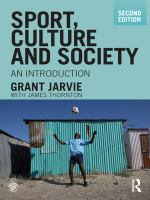The 2014 Commonwealth Games start today and we’ve had a look through the wealth of e-books currently available to University staff and students at the Library, to pull together just a small number of titles that look at different aspects of sport related to social and political science.
 Sport, culture and society: an introduction by Grant Jarvie with James Thornton looks at the place of sport in contemporary society and culture. It argues that sport is part of our social and cultural fabric, possessing a social and commercial power that makes it a potent force in the world, for good and for bad. It looks at how sport has helped to start wars and promote international reconciliation, while every government around the world commits public resources to sport because of its perceived benefits.
Sport, culture and society: an introduction by Grant Jarvie with James Thornton looks at the place of sport in contemporary society and culture. It argues that sport is part of our social and cultural fabric, possessing a social and commercial power that makes it a potent force in the world, for good and for bad. It looks at how sport has helped to start wars and promote international reconciliation, while every government around the world commits public resources to sport because of its perceived benefits.
International diplomacy and the Olympic movement: The new mediators by Aaron Beacom explores the relationship between diplomatic discourse and the Olympic Movement. It examines the evolution of diplomatic discourse around a number of themes, in particular the increasing range of stakeholders engaged in the Olympic bid, disability advocacy and the mainstreaming of the Paralympic Games and the evolution of the Olympic boycott.
Understanding sport: a socio-cultural analysis by John Horne, Alan Tomlinson, Gary Whannel and Kath Woodward offers a critical and reflective introduction to the relationship between sport and contemporary society and explains how sport remains an important agent and symptom of socio-cultural change.
 Power play: sport, the media and popular culture by Raymond Boyle and Richard Haynes examines the link between three key obsessions of the 21st century: the media, sport and popular culture. It explore a wide range of sports, as well as issues including nationalism, gender, race, political economy and the changing patterns of media sport consumption. It traces the historical evolution of the relationship between sport and the media and examines the complex business relationships that have grown up around television, sponsors and sport.
Power play: sport, the media and popular culture by Raymond Boyle and Richard Haynes examines the link between three key obsessions of the 21st century: the media, sport and popular culture. It explore a wide range of sports, as well as issues including nationalism, gender, race, political economy and the changing patterns of media sport consumption. It traces the historical evolution of the relationship between sport and the media and examines the complex business relationships that have grown up around television, sponsors and sport.
Olympic Games, mega-events and civil societies: Globalization, environment, resistance edited by Graeme Hayes and John Karamichas explores sports mega-events and their social, political, and cultural characters. It also looks at the value systems that they inscribe and draw on, the claims they make on us and the claims the organisers make for them, the spatial and ethical relationships they create, and the responses of civil societies to them. It argues that sports mega-events, as well as being sporting or cultural phenomena, are political and economic events, characterised by the generation and projection of symbolic meanings and by social conflict.
 Sports on television: the how and why behind what you see by Dennis Deninger discusses the history of the industry and discipline, the pioneering events of sports broadcasting and sports television, and gives a nuts-and bolts, behind-the-scenes look at a sports television production. It also examines the impact that sports and the mass media have had (and are continuing to have) on one another and on society.
Sports on television: the how and why behind what you see by Dennis Deninger discusses the history of the industry and discipline, the pioneering events of sports broadcasting and sports television, and gives a nuts-and bolts, behind-the-scenes look at a sports television production. It also examines the impact that sports and the mass media have had (and are continuing to have) on one another and on society.
You can find more e-books and print books that the Library has in its collections by searching the Library Catalogue.
Why not have a look at our World Cup inspired reading list, Fitba’ crazy, fitba’ mad?
Caroline Stirling – Academic Support Librarian for Social and Political Science.
